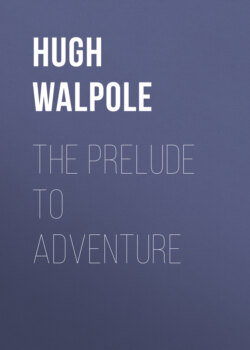Читать книгу The Prelude to Adventure - Hugh Walpole - Страница 5
На сайте Литреса книга снята с продажи.
1
ОглавлениеTable of Contents
"There is a God after all." That was the immense conviction that faced him as he heard, slowly, softly, the leaves, the twigs, settle themselves after that first horrid crash which the clumsy body had made.
Olva Dune stood for an instant straight and stiff, his arms heavily at his side, and the dank, misty wood slipped back once more into silence. There was about him now the most absolute stillness: some trees dripped in the mist; far above him, on the top of the hill, the little path showed darkly—below him, in the hollow, black masses of fern and weed lay heavily under the chill November air—at his feet there was the body.
In that sudden after silence he had known beyond any question that might ever again arise, that there was now a God—God had watched him.
With grave eyes, with hands that did not tremble, he surveyed and then, bending, touched the body. He knelt in the damp, heavy soil, tore open the waistcoat, the shirt; the flesh was yet warm to his touch—the heart was still. Carfax was dead.
It had happened so instantly. First that great hulking figure in front of him, the sneering laugh, that last sentence, "Let her rot … my dear Dune, your chivalry does you credit." Then that black, blinding, surging rage and the blow that followed. He did not know what he had intended to do. It did not matter—only in the force that there had been in his arm there had been the accumulated hatred of years, hatred that dated from that first term at school thirteen years ago when he had known Carfax for the dirty hypocrite that he was. He could not stay now to think of the many things that had led to this climax. He only knew that as he raised himself again from the body there was with him no feeling of repentance, no suggestion of fear, only a grim satisfaction that he had struck so hard, and, above all, that lightning certainty that he had had of God.
His brain was entirely alert. He did not doubt, as he stood there, that he would be caught and delivered and hanged. He, himself, would take no steps to prevent such a catastrophe. He would leave the body there as it was: to-night, to-morrow they would find it—the rest would follow. He was, indeed, acutely interested in his own sensations. Why was it that he felt no fear? Where was the terror that followed, as he had so often heard, upon murder? Why was it that the dominant feeling in him should be that at last he had justified his existence? In that furious blow there had leapt within him the creature that he had always been—the creature subdued, restrained, but always there—there through all this civilized existence; the creature that his father was, that his grandfather, that all his ancestors, had been. He looked down. The hulking body that had been Carfax made a hollow in the wet and broken fern. The face was white, stupid, the cheeks hanging fat, horrible, the eyes staring. One leg was twisted beneath the body. Still in the air there seemed to linger that startled little cry—"Oh!"—surprise, wonder—and then fading miserably into nothing as the great body fell.
Such a huge hulking brute; now so sordid and useless, looking at last, after all these years, the thing that it ought always to have looked. Some money had rolled from the pocket and lay shining amongst the fern. A gold ring glittered on the white finger, seeming in the heart of that silence the only living note.
Then Olva remembered his dog—where was he? He turned and saw the fox terrier down on all fours amongst the fern, motionless, his tongue out, his eyes gazing with animal inquiry at his master. The dog was waiting for the order to continue the walk. He seemed, in his passivity, merely to be resting, a little exhausted perhaps by the heavy closeness of the day, too indolent to nose amongst the leaves for possible adventure: Olva looked at him. The dog caught the look and beat the grass with his tail, soft, friendly taps to show that he only waited for orders. Then still idly, still with that air of gentle amusement, the dog gazed at the thing in the grass. He rose slowly and very delicately advanced a few steps: for an instant some fear seemed to strike his heart for he stopped suddenly and gazed into his master's face for reassurance. What he saw there comforted him. Again he wagged his tail placidly and half closed his eyes in sleepy indifference.
Then Olva, without another backward glance, left the hollow, crashed through the fern up the hill and struck the little brown path. Bunker, the dog, pattered patiently behind him.
